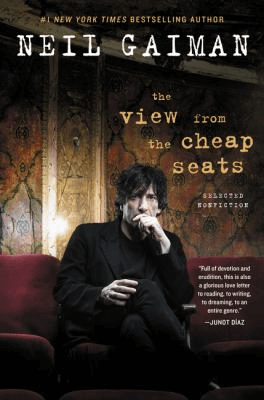Ladies and Gentlemen, we’ve made it! It is the end of Summer Reading and alas, it’s the end of my non-fiction-centered reading list. I’ve learned some interesting tidbits about the universe, surfing, mental illness and anxiety and the human gene.
I have no idea how long I’ll be able to actually retain the information, but if I can take a tidbit from each book (and win trivia contests!) I will be infinitely happy. However, with so much science going on, I needed a bit of a break on that subject for the last non-fiction pick of the summer.

My final book comes courtesy of Mr. Neil Gaiman, one of my favorite authors. I’ve read just about everything he has written and he keeps getting better with each new offering. The View From the Cheap Seats, a collection of essays, is no different.
You might wonder how a world-famous author with a massive following ever sat in the cheap seats, but it is possible.
While he may be deeply appreciated in the literary world, it seems he is not in Hollywood’s ELITE inner circle. View’s title comes from Gaiman’s experience at the 2010 Oscars when Coraline (2009) was nominated for that year’s Best Animated Feature (and had no chance of winning—it was the year Pixar’s classic Up came out).
He was therefore relegated to the “cheap seats” (balcony) at the Oscars and not even allowed to come down to the lobby, lest he bother the A-listers. This made quite an impression on him. He even wrote about his experience for The Guardian.
How did this collection come about? While many know of Neil Gaiman’s experience in comic books, he was also a journalist who “backed awkwardly away” from his chosen career onto a more suitable path as a creative genius who has written everything from children’s books to novels to screen adaptations and comics.
His grounding in journalism helped him develop his unique narrative voice, and it suits him well in this large compendium of speeches, forwards, essays, liner notes and general bits and bobs.
The 80 or so separate pieces are divided into ten sections of varying themes, starting with speeches on the virtues of reading, libraries (my personal favorite) and bookstores. From there, it goes on to cover a multitude of subjects including films, authors (some you will have heard of, some of whom may be new to you), genre fiction, music and current events.
Make Mistakes. Make great mistakes, make wonderful mistakes, make glorious mistakes. Better to make a hundred mistakes than to stare at a blank piece of paper too scared to do anything wrong, too scared to do anything. -Neil Gaiman
Like a master, he weaves a fair bit of autobiography throughout this tapestry, but always through the lens of his subject matter.
This book is filled with humor, common sense and the initial glimpse of the creative spark that cannot be buried. His musings on art and writing tell us to never hold back.
My favorite bit comes in the essay “Make Good Art,” in which he instructs us to: “Make Mistakes. Make great mistakes, make wonderful mistakes, make glorious mistakes. Better to make a hundred mistakes than to stare at a blank piece of paper too scared to do anything wrong, too scared to do anything.”
Gaiman’s every-man wisdom gives the reader a glimpse into how a mind like his sees the world, and reinforces the concept of man’s infinite creative potential. This book is an inspiration for anyone interested in the arts and literacy and was a breath of fresh air—a respite from the endless cycle of bad news.
Pick this book up and, just for a moment, feel the sense of wonder and amazement you felt as a child—when possibilities were infinite and being brave seemed no more difficult then placing one foot in front of the other.
Want Some Inspiration?
Check out The View From the Cheap SeatsWhitney Z. is a native Pittsburgher. She is currently a substitute Library Assistant who loves audiobooks, music and movies. She believes firmly that NASA made a mistake in demoting Pluto and would sincerely like for said decision to be reversed.
